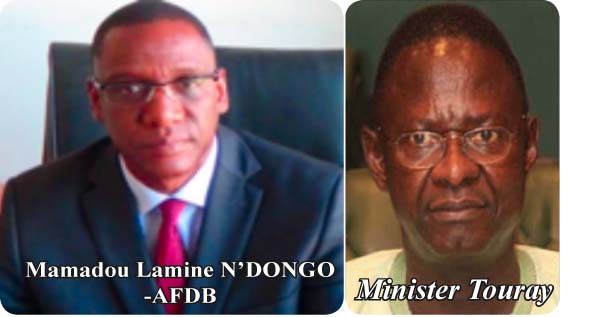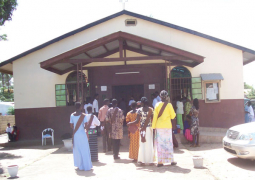
The African Development Bank, AfDB, has been speaking about relations with The Gambia, in an article to celebrate 50 years of the institution. According to the article issued for publication, the AfDB’s longstanding and strong partnership with The Gambia started back in 1974.
“Since then, the AfDB has already approved in total 65 operations to a value of approximately UA 304 million (Dalasi 18.5 billion) distributed as follow: infrastructure (39.9%), agriculture and rural development (30.4%), social (20.4%), multisector (10.4%), environment (3.9%) and industry and mining (2%)”.
The article added: “AfDB’s ongoing portfolio in The Gambia comprises 8 operations of approximately UA 33.2 million (Dalasi 2 billion) in following sectors: rural (72.3 %); water and sanitation (19.5 %); and Governance (8.2 %). In addition to the national operations described above, the Gambia portfolio comprises 4 multinational operations amounting to UA 92,8 million (Dalassi 5 billion).
“This multinational operations of which the Trans-Gambia Bridge valued at UA 63.5 million (Dalasi 3,8 billion) are very important for regional integration and trade facilitation to the sub-region.”
“Overall, the performance of the portfolio in The Gambia is satisfactory,” the article further stated.
It went on: “The Program for Accelerated Growth and Employment PAGE (2012-2015), the national strategy, emphasizes fiscal adjustment, together with infrastructure investment and structural reforms to support inclusive growth. It is based on five pillars: (i) Accelerating and sustaining economic growth; (ii) Improving and modernizing infrastructure; (iii) Strengthening human capital stock and enhancing access to social services; (iv) Improving governance and increasing economic competitiveness; and (v) Reinforcing social cohesion and mainstreaming cross-cutting issues.
“Jointly prepared and implemented by the AfDB and the World Bank, the second Joint Assistance Strategy (JAS-2) for the 2012-15period supports the Government’s 2012-15 PAGE. The JAS concentrates on two main pillars: (i) Enhancing Productive Capacity and Competitiveness in order to strengthen resilience to External Shocks; (ii) Strengthening the Institutional Capacity for Economic Governance and Public Service Delivery.
“The AfDB focuses on economic governance and agriculture, while the World Bank, in addition to these, focuses on infrastructure (energy, internet connectivity, human development, and private sector development). Under the ADF-13 cycle (2014-2016), the Gambia allocation from the AfDB has been substantially increased from UA 6.3 million to UA 15 million”.
The article said “AfDB’s commitment to the country’s transformation agenda has served as the impetus to the quality of the dialogue and partnership with the government. The strengthening of the Dakar regional office, which also covers The Gambia has helped to foster closer dialogue with the government and other development partners. In fact, strengthening the team of experts at the regional office helps to further reinforce project monitoring missions and to ensure: (i) sustained stakeholder consultations; and (ii) monitoring of the bank’s portfolio in The Gambia”.
The article reported “tangible results” from the AfDB’s operations in The Gambia. “Recently, positive results have been obtained: the Institutional Support for Economic and Financial Governance II Project (ISEFG II) contributed to the strengthening of the capacity of the National Audit Office (NAO) and its performance.
“The Sustainable Land Management Project (SLMP) improved significantly livelihoods through promotion of community-based watershed/landscape management approaches, enabling resource-poor communities to reverse declining land productivity and overcome the causes and negative impacts of land degradation on the structure and functional integrity of The Gambia’s lowland, and upland ecosystem resources.
“Through the implementation of the Regional Project on Sustainable Management of Endemic Ruminant Livestock (PROGEBE) which objectives is to conserve the biodiversity of endemic ruminant livestock and increase their productivity; tangible results have been obtained notably productivity records of the mini dairy centers; watering points and the containment of conflicts as a result of the stock route demarcation/fencing, among others.
“The Rural Water Supply Sanitation Project (RWSSP) has direct and indirect economic and social benefits to women and girls in rural areas in terms of availability of adequate and potable water supply and sanitation facilities that allow the population to live healthier and productive lives.
“The availability of these services enables the rural population, especially women to devote the time previously spent on fetching water on other productive activities. The project encourages school attendance, especially for girls.
“Concerning the Trans-Gambia Corridor Project, related activities will benefit women in terms of cross border trading and reinforce HIV/AIDS/STI awareness and prevention and education campaigns targeting children, cyclists, pedestrians, and public service operators”.


